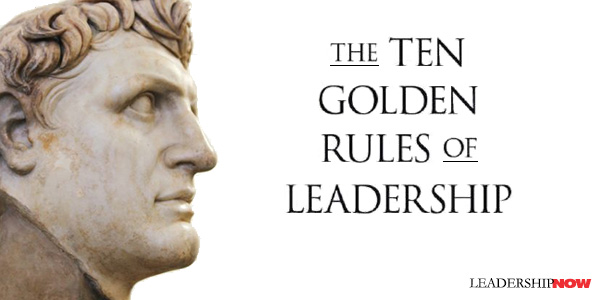The Ten Golden Rules of Leadership

MICHAEL SOUPIOS and Panos Mourdoukoutas have reviewed the writings of the Classical philosophers and selected ten ideas that will positively impact our leadership effectiveness in The Ten Golden Rules of Leadership. Not surprisingly, the philosophies of classic figures remain relevant in today's workplace.
Early on, the authors suggest that the raw material of leadership is not latent in just about everyone and rightly discredit the idea that it “just takes a nudge to trigger its unfolding.” Further, they say that the “special qualities of genuine leadership are remarkably complex and rare.” It is true that good leaders are not as common as they need to be and that we do confuse administration with actual leadership as they suggest, but the potential is there in each one of us. The problem is that it remains latent in many of us. We choose not to do the work necessary and instead assume reading “Leadership Lessons I Learned from My Cat” is enough to unlock our potential.
The authors do expose the real culprit at the end of the book: “Achieving the rank of genuine leader is a daunting task that most will find prohibitively challenging.” In short, “leadership requires a special form of courage: the courage to fashion a code of conduct governed by principled conviction.”
Genuine leadership is not complex, but it is difficult because it requires that we do the inner work on a continual basis. And that is a lot to commit to. It’s lifelong. And what we want to do is to check it off and mark it as good enough. Sustainable leadership requires a radical life-long commitment to rule one of leadership: Know Thyself.
Rule 1: “Know Thyself.” –Thales
This is an intimidating task and one that many leaders never really get around to. It never seems as important as the task at hand. The larger issue though is that we all possess a “powerful tendency to obscure, distort, and fictionalize on behalf of a fabricated reality.” The authors note that “Knowing Thyself means bringing a fresh transparency to our hidden motives and identities.” They suggest that a would-be leader commit to “an agenda of spirited self-indictment.”
Rule 2: “Office Shows the Person.” –Pittacus
Giving a person power reveals their inner qualities. “Specifically, power discloses whether or not a person has disposed of the psychological deficiencies that negate the possibility of real leadership.”
Rule 3: “Nurture Community at the Workplace.” –Plato
Plato insisted that “there is no greater evil than discord and faction and no greater good than the bonds of communal sentiment.” The idea is that if one part of the body suffers, we all suffer. “Foster a culture of cooperation and collaboration by defying the myth of the exceptional individual and by explaining the corporate gains of working together.”
Rule 4: “Do Not Waste Energy on Things You Cannot Change.” –Aristophanes
The Athenian playwright Aristophanes wrote in his play titled Peace, “Never will you make the crab walk straight.” Some things we cannot change. “Leaders must assume a posture of flexible response.”
Rule 5: “Always Embrace the Truth.” –Antisthenes
Antisthenes wrote, “There are only two people who will tell you the truth about yourself—an enemy who has lost his temper and a friend who loves you dearly.” “Honest assessment is an essential requirement of effective leadership.” The problem is that the higher up the ladder you go, the less likely you will receive complete and accurate information.” Seek the truth. Hire a heretic.
Rule 6: “Let Competition Reveal Talent.” –Hesiod
Hesiod suggested that competition that releases selfishness is destructive, but competition that releases ingenuity and creativity is a constructive use of competition. Strife, then, is not the byproduct but inner excellence and personal development.
Rule 7: “Live Life by a Higher Code.” –Aristotle
Aristotle wrote of the “magnanimous man” or the “great-souled” person. He is referring to a person that lives by a higher or more rigorous code than the average person, but not in a vain way. “When it comes to the great-souled individual, personal honor, not ego, is the ultimate priority and concern.”
Rule 8: “Always Evaluate Information with a Critical Eye.” –The Skeptics
“Leaders should never assume that the information they receive is unsoiled by hidden agendas or political agendas.” The problem, though, is even more personal than that. Socrates reminded us that “we must be vigilant against the conceits of wisdom [and] that we are all strongly inclined to assume we understand things that in truth we fail to genuinely comprehend.”
Rule 9: “Never Underestimate the Power of Personal Integrity.” –Sophocles
In the play Philoctetes by Sophocles, one of the two central characters believes that the ends justify the means; “one should not allow moral concerns to impede the necessities of practical achievement.” In the face of this seductive idea, the other main character, Neoptolemus, responds, “I would prefer even to fail with honor than win by cheating.” It’s easy to rationalize wrong behavior.
Rule 10: “Character Is Destiny.” –Heraclitus
Our character or our moral essence determines the course of our lives. While we can’t control the world around us, “Heraclitus was correct to insist that we are, to a very great extent, the authors of both our own blessings and our own burdens.” “A well-formed character,” write the authors, “is the priceless reward paid to those who have done the hard work of coming to know themselves.”
* * *

Follow us on
Instagram and
Twitter for additional leadership and personal development ideas.
* * *

Posted by Michael McKinney at 04:24 PM
Permalink
| Comments (0)
| This post is about Leadership Development
, Personal Development










